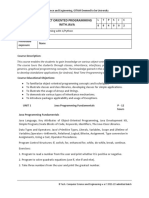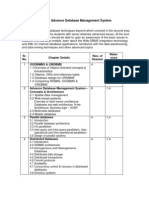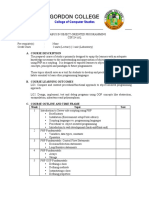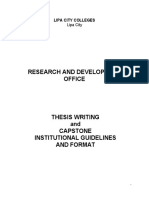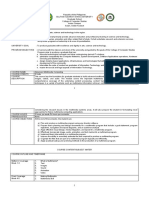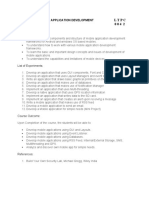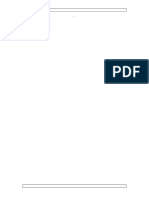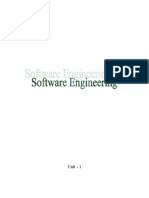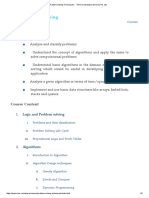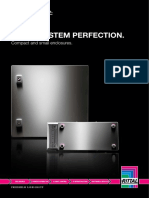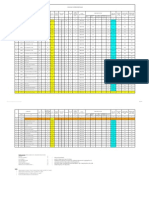C++ Syllabus
C++ Syllabus
Uploaded by
pomar026Copyright:
Available Formats
C++ Syllabus
C++ Syllabus
Uploaded by
pomar026Copyright
Available Formats
Share this document
Did you find this document useful?
Is this content inappropriate?
Copyright:
Available Formats
C++ Syllabus
C++ Syllabus
Uploaded by
pomar026Copyright:
Available Formats
THE HASHEMITE UNIVERSITY Faculty of Engineering Course Syllabus Course Title: Department: Prerequisite(s): Instructor: Instructor's e-mail: Course
Website: Office Hours: Class Time: Course description:
C++ Programming Course Number: Computer Engineering Designation: 1011100 Eng. Ghada Al-Mashaqbeh Instructor's Office: ghada@hu.edu.jo www.hlms.hu.edu.jo (BlackBoard) Daily, 10:20 am 11:20 am Daily, 09:10 am 10:10 am 0408110 Compulsory E 2034
Class Room:
WC 311
This course covers the main concepts and principles of Computer Fundamentals and Components, Computer Operation, Elements of Programming, Structured Programming Methods, C++ programming language, Variable Declaration, Assignment, Input/Output, Control Structures, Functions, Arrays (1-D and 2-D), files and dynamic memory allocations in addition to pointers concepts. C++ How to program, Deitel, 4th Edition Handouts and notes given by the instructor. Successful completion of this course should lead to the following learning outcomes: 1. Knowledge and Understanding: I. Learn programming concepts and acquire skills needed to program in the C++ computer language. II. Being able to read a simple C++ program and predict the outcome and output of the program. III. Write a program using the C++ arithmetic operators, input/output methods and appropriate manipulators for formatting. IV. Use both one dimensional and multi-dimensional arrays. V. Use character data and string processing. 2. Intellectual skills with ability to: I. Understand and analyze various programming problems. II. Design algorithms to solve the problems. III. Use the C++ instruction to implement the solutions. 3. Practical skills - with ability to: I. Being able to write short programs in pseudo code, flowcharts and in the C++ programming language. II. Edit, compile, execute and get results of C++ programs. III. Write advanced programs using the C++ arithmetic operators, input/output methods, appropriate manipulators for formatting, selection and looping statements. IV. Write modular well-designed programs using functions with parameters passed by value and by reference. 4. Transferable skills with ability to I. Use the visual studio 6 package. II. Work on C++ project for the education and for industry. III. Analyze and write new algorithms.
Textbook(s): Other required material: Course objectives:
Topics covered:
Title
Introduction: History of computer, Element of a computer system, The evolution of programming languages, Processing a high level language program, Programming with the Problem Analysis CodingExecution Cycle, Algorithms and Flowcharts. Basic elements of C++: The basics of a C++ program, Data types, Arithmetic operators and operator precedence, Expressions, Casting, Input, Increment and Decrement operators, Output, program style and form. Control Structure I (Selection ): Relational Operators, Logical operators and Expressions, Selection: if and if else, switch structures. Control Structure II (Repetition): while looping, For looping, do while looping, break and continue, nested control structures. File processing. User defined functions: predefined functions, header files, function definition, function prototype, function parameters, Calling Functions (call by value, call by reference), Random number generation, inline functions, default arguments, recursion, function templates, and function overloading. Input/Output Manipulations Arrays: Concept of One dimensional arrays, Input/Output of One dimensional arrays, Manipulation of arrays, Arrays as arguments (passing array to function), Multidimensional arrays. Array of characters (String). Pointers and strings.
Textbook Chapter
Chapter 1
Chapter 2, Chapter 21
Chapter 2
Chapter 2
Chapter 14 Chapter 3
Chapter 18 Chapter 4
Chapter 5
Class schedule: Grading Plan:
5 class sessions each week; 60 minutes each. First Exam Second Exam Final Exam Quizzes & HWs (15 Points) (15 Points) (50 Points) (20 Points) TBD TBD Will be announced by the registrar --
General Notes:
Attendance: Mandatory. No more than 15% absence is permitted. Entering the Class Room: You have 5 minutes to enter the class after the starting time. The door will be closed after that. Note that if you enter after the first 5 minutes you will lose the quiz if any. Make ups: Make up exams will be only conducted for students who have a valid excuse for missing the exams. Bear in mind that make up will be much harder than the normal exam. Cell Phones: must be closed before entering the class. Cheating: Dont risk your semester. Be smart enough to pass.
Course contribution:
Professional Component General Education Basic Science and Mathematics Engineering Science Engineering Design Course Contribution Learn the basic concepts of computer programming which represent a basic block in computer engineering. Applying the different arithmetic and logical operations and implementing mathematical algorithms using C++ coding. Learn the structure, characteristics, and the principles of computer software programming and its usage in the real life. Determine the proper software algorithm to solve engineering problems.
Relationship to program outcomes:
ABET a-n a b c d e f g h i j k CPE Program Outcomes Ability to apply knowledge of mathematics, science, and engineering. Ability to design and conduct experiments, as well as to analyze and interpret data. Ability to design a system, component, or process to meet desired needs. Ability to function on multi-disciplinary teams. Ability to identify, formulate, and solve engineering problems. Understanding of professional and ethical responsibility. Ability to communicate effectively. Broad education necessary to understand the impact of engineering solutions in a global and societal context. Recognition of the need for, and an ability to engage in life-long learning. Knowledge of contemporary Computer Engineering issues. Ability to use techniques, skills and tools in engineering practice.
Prepared by:
Eng. Ghada Al-Mashaqbeh
Date:
21-6-2009
You might also like
- CSC388 SyllabusDocument8 pagesCSC388 Syllabussk8asd123No ratings yet
- Syllabus CSEN1111-OOP With JavaDocument7 pagesSyllabus CSEN1111-OOP With JavaKANCHARLA SUNIL KUMAR REDDY 122010319012No ratings yet
- Unified Modelling LanguageDocument33 pagesUnified Modelling LanguageShivaani Aggarwal71% (7)
- VNIT Syllabus Electronics and CommunicationsDocument55 pagesVNIT Syllabus Electronics and CommunicationsANKIT BHURANENo ratings yet
- COEN 3134 - Logic Circuits and Switching Theory Syllabus - CANSINODocument4 pagesCOEN 3134 - Logic Circuits and Switching Theory Syllabus - CANSINOjocansino4496No ratings yet
- Advanced Database Management SystemsDocument2 pagesAdvanced Database Management Systemspreetu1986No ratings yet
- Object-Oriented-Programming With PHP5 SYLLABUSDocument3 pagesObject-Oriented-Programming With PHP5 SYLLABUSArmilyn Tizon-MartinezNo ratings yet
- Operators Assignment PDFDocument12 pagesOperators Assignment PDFWaseem JavedNo ratings yet
- 01 - Software Engineering - II (Course Outline)Document4 pages01 - Software Engineering - II (Course Outline)Junaid ArshadNo ratings yet
- SHS ICT 11 M4 5 Week 4 5Document13 pagesSHS ICT 11 M4 5 Week 4 5Hazel Mjkristell Basallote FranceNo ratings yet
- Module For Thesis Format 2Document51 pagesModule For Thesis Format 2Eloiza Lajara RamosNo ratings yet
- Digital Logic Design-SyllabusDocument2 pagesDigital Logic Design-SyllabusSri MathiNo ratings yet
- MIT 124 Advanced Multimedia Computing SyllabusDocument9 pagesMIT 124 Advanced Multimedia Computing SyllabusZeroCodeNo ratings yet
- Assignment #4v PFDocument6 pagesAssignment #4v PFhabiti747No ratings yet
- Info - Assurance - N - Secu - 1 - Quiz1 - Dimaano, Zareena A.Document3 pagesInfo - Assurance - N - Secu - 1 - Quiz1 - Dimaano, Zareena A.Zareena AgapanNo ratings yet
- Lab WorkDocument45 pagesLab Workhumairamughal178No ratings yet
- Espanillo Midterm Exam Data Structure 2it2Document10 pagesEspanillo Midterm Exam Data Structure 2it2pia espanilloNo ratings yet
- Discrete Math SyllabusDocument2 pagesDiscrete Math SyllabusblahblahNo ratings yet
- BSCS OBE Syllabus For Computer Programming 1Document7 pagesBSCS OBE Syllabus For Computer Programming 1LoiDa Flores100% (1)
- Lab Work (Repetition)Document3 pagesLab Work (Repetition)Syahirah ZakiNo ratings yet
- NET JAVA Week1 ModuleDocument18 pagesNET JAVA Week1 ModuleMCTVE SHSNo ratings yet
- IT 12 Data Communication With Networking OBE Syllabus 1hourDocument8 pagesIT 12 Data Communication With Networking OBE Syllabus 1hourLawrence SisonNo ratings yet
- Syllabus: CS 121 Computer ProgrammingDocument2 pagesSyllabus: CS 121 Computer ProgrammingDrift ValleyNo ratings yet
- Syllabi in Networks and Communications Nc101Document3 pagesSyllabi in Networks and Communications Nc101Sarah May Nacion MorescoNo ratings yet
- Module 3 LabDocument7 pagesModule 3 LabGuru Khb PblNo ratings yet
- Approved OBE BSCS CurriculumDocument4 pagesApproved OBE BSCS CurriculumJhe LoNo ratings yet
- Mobile App Development Lab SyllabusDocument1 pageMobile App Development Lab Syllabuscsa1No ratings yet
- Syllabus (Software Engineering)Document6 pagesSyllabus (Software Engineering)deb galangNo ratings yet
- FREL2 PRELIM EXAM - Set01Document5 pagesFREL2 PRELIM EXAM - Set01Andrjstne SalesNo ratings yet
- Introduction To Computing (CSEN1201) SyllabusDocument2 pagesIntroduction To Computing (CSEN1201) Syllabussomenath_sengupta100% (1)
- Lab 02Document11 pagesLab 02Mujtaba KhanNo ratings yet
- Introduction To Computing: What Is A Computer?Document11 pagesIntroduction To Computing: What Is A Computer?Nirmala BandooNo ratings yet
- HTML5 Document For ActivityDocument7 pagesHTML5 Document For ActivityCristian Parra VargasNo ratings yet
- Chapter 5: C++ OperatorsDocument4 pagesChapter 5: C++ OperatorsRyan ZaguirreNo ratings yet
- 01 - Thesis and Capstone Project Quick Outline V3.0Document2 pages01 - Thesis and Capstone Project Quick Outline V3.0Ian Dave D. EjercitoNo ratings yet
- Computer Programming 1 Ched FormatDocument5 pagesComputer Programming 1 Ched FormatKhimberly Xylem OrtizNo ratings yet
- R18 B.Tech. CSE Syllabus Jntu HyderabadDocument2 pagesR18 B.Tech. CSE Syllabus Jntu HyderabadSrikanth Jannu50% (2)
- Lab/Tutorial Exercise 5 - Repetition Structure II Semester SEP 2018Document12 pagesLab/Tutorial Exercise 5 - Repetition Structure II Semester SEP 2018xinyi woonNo ratings yet
- 2016-2017 Computer Programming 2 SyllabusDocument22 pages2016-2017 Computer Programming 2 SyllabusRhey CostalesNo ratings yet
- DICT50 Object Oriented ProgrammingDocument13 pagesDICT50 Object Oriented ProgrammingJe_RebanalNo ratings yet
- Social and Professional Issues Course Syllabus 2022Document29 pagesSocial and Professional Issues Course Syllabus 2022H A N ANo ratings yet
- Computer Hardware TrainerDocument10 pagesComputer Hardware TrainerBusiness BusinessNo ratings yet
- Introduction To Computing Syllabus 2022 2023Document9 pagesIntroduction To Computing Syllabus 2022 2023beverly arevaloNo ratings yet
- Software Engineering 2Document111 pagesSoftware Engineering 2umesh91No ratings yet
- ITPEC2 - Platform TechnologiesDocument19 pagesITPEC2 - Platform TechnologiesJhe MaejanNo ratings yet
- Problem Solving Skills - Way2tcsDocument302 pagesProblem Solving Skills - Way2tcsGaurav Jain100% (1)
- Ccs0003 Computer Programming 1 Lec SyllabusDocument6 pagesCcs0003 Computer Programming 1 Lec SyllabusAnonuevo June PaulNo ratings yet
- Integrative ProgrammingDocument2 pagesIntegrative ProgrammingRaymond RamirezNo ratings yet
- C++ FQ PrelimsDocument3 pagesC++ FQ PrelimsRhexel ReyesNo ratings yet
- GEC 9 Prelim ExamDocument3 pagesGEC 9 Prelim ExamCrisjoan BautistaNo ratings yet
- Software Engineering Module 1Document34 pagesSoftware Engineering Module 1amant0% (1)
- IT141 System Administration and Maintenance Subject Chapter1Document13 pagesIT141 System Administration and Maintenance Subject Chapter1Von Eisenheim100% (1)
- Fundamentals of Information TechnologyDocument2 pagesFundamentals of Information TechnologyRey De LeonNo ratings yet
- Laboratory Manual For IT Fundamentals For ITDocument60 pagesLaboratory Manual For IT Fundamentals For ITIvan James Abueg FermanejoNo ratings yet
- Data Warehouse and Data Mining: Lab ManualDocument69 pagesData Warehouse and Data Mining: Lab ManualFfdgsff100% (1)
- Bes 103 - Computer Fundamentals and Programming - PairaDocument7 pagesBes 103 - Computer Fundamentals and Programming - PairaTOP ERNo ratings yet
- Integrative Programming and Technologies 1obe SyllabusDocument5 pagesIntegrative Programming and Technologies 1obe SyllabusRige Mae MuescoNo ratings yet
- Module 3 - Agents EnvironmentsDocument7 pagesModule 3 - Agents EnvironmentsPaul BokingkitoNo ratings yet
- CRDi Engine DiagnosisDocument5 pagesCRDi Engine DiagnosisAhmad Nashrullah0% (2)
- Food Application Online Food Ordering SyDocument7 pagesFood Application Online Food Ordering SyMwanje AbiyasaaliNo ratings yet
- Software EngineeringDocument4 pagesSoftware EngineeringRafael De LeónNo ratings yet
- HTML5 Element Cheatsheet 2019Document1 pageHTML5 Element Cheatsheet 2019vVvNo ratings yet
- Laptop Hard Disk: (Built-In Wifi)Document6 pagesLaptop Hard Disk: (Built-In Wifi)ryoemanNo ratings yet
- 03 ComponentLibraryOverview PDFDocument101 pages03 ComponentLibraryOverview PDFGiuseppeNo ratings yet
- Lab1 AM Modulation Demod HandoutDocument5 pagesLab1 AM Modulation Demod HandoutAshok Naik100% (1)
- Java AnsDocument4 pagesJava AnsCh SubhashNo ratings yet
- Wepik Revolutionizing Business Unleashing The Power of Blockchain Technology 20231121042932fJZwDocument12 pagesWepik Revolutionizing Business Unleashing The Power of Blockchain Technology 20231121042932fJZwsuchdev darshanNo ratings yet
- Answer Key Class Test-9 - OnlineDocument1 pageAnswer Key Class Test-9 - OnlinevinayakNo ratings yet
- How To Install And/Or Upgrade To Hyland Onbase Unity Client V17 Via Software CenterDocument5 pagesHow To Install And/Or Upgrade To Hyland Onbase Unity Client V17 Via Software CenterAlberto José Segrera FernándezNo ratings yet
- UDC Technical CourseDocument44 pagesUDC Technical Courseomer_kNo ratings yet
- MM35 Product SheetDocument2 pagesMM35 Product Sheetpablo ReynesNo ratings yet
- Event Booking Form PDFDocument2 pagesEvent Booking Form PDFJamesNo ratings yet
- 0 - Various Information-AbbrevationsDocument2 pages0 - Various Information-AbbrevationsioanNo ratings yet
- Smart Class ProjectDocument5 pagesSmart Class ProjectMousumi SamantaNo ratings yet
- A Self-Adaptive Sleep Wake-Up SchedulingDocument82 pagesA Self-Adaptive Sleep Wake-Up SchedulingAsha SumithaNo ratings yet
- Solution RequirementsDocument2 pagesSolution RequirementsTharun RagavNo ratings yet
- Rittal KX CatalogDocument144 pagesRittal KX Cataloggstefan8970No ratings yet
- Difference Between Abstract Class and InterfaceDocument4 pagesDifference Between Abstract Class and InterfaceManish WsCubeNo ratings yet
- Proton Exora Mk1 RC 1.6 Premium CVT (2019) Vs Proton Persona P2-21A MC 1.6 Premium CVT (2019) Vs Proton Ertiga P6-90A 1.4 Executive Plus at (2018) - Carbase - MyDocument5 pagesProton Exora Mk1 RC 1.6 Premium CVT (2019) Vs Proton Persona P2-21A MC 1.6 Premium CVT (2019) Vs Proton Ertiga P6-90A 1.4 Executive Plus at (2018) - Carbase - MyFirdauz AbdullahNo ratings yet
- SDLG Wheel Loader LG968 - E6811213A36 ENGINE DongFeng SC11CB C6121Document330 pagesSDLG Wheel Loader LG968 - E6811213A36 ENGINE DongFeng SC11CB C6121Emmanuel Garcia Ozan100% (2)
- Odi2-065r17m-Gq V1 DS 1-0-0Document2 pagesOdi2-065r17m-Gq V1 DS 1-0-0morten.eriksenNo ratings yet
- JBL 125 - SatDocument2 pagesJBL 125 - SatzocanNo ratings yet
- Burner - Ys - Turbofire II - ManualDocument47 pagesBurner - Ys - Turbofire II - ManualDHINAKARAN KumarNo ratings yet
- Why Should You Care About Uda in Human Resources?Document3 pagesWhy Should You Care About Uda in Human Resources?Heru WiryantoNo ratings yet
- EzoBord - Ceiling Baffle - Installation InstructionsDocument3 pagesEzoBord - Ceiling Baffle - Installation InstructionsMEPNo ratings yet
- CPMS-AUT-EP-001 - Flow Measurement and Metering Philosophy Guideline PDFDocument6 pagesCPMS-AUT-EP-001 - Flow Measurement and Metering Philosophy Guideline PDFChrisNo ratings yet
- Shirt School Shopify Cheat Sheet - 23Document3 pagesShirt School Shopify Cheat Sheet - 23Nizamuddin QureshiNo ratings yet
- AC Cable Sizing and Ampacity CalculationDocument2 pagesAC Cable Sizing and Ampacity Calculation一 克No ratings yet

